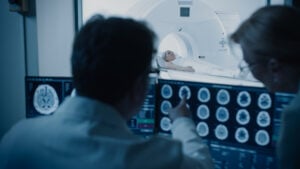Breast cancer was once considered a condition with a relatively poor recovery rate. However, today, it is seen as manageable. According to the Cancer Research Institute, approximately one in eight women and one in 1,000 men will develop invasive breast cancer at some point in their lives.
Targeted treatments, such as those that destroy or prevent the growth of cancer cells, as well as drugs designed to enhance the body’s immune system to combat invasive cancer, are among the latest therapies successfully used to treat breast cancer. Other treatments include radiotherapy, hormone therapy (which blocks or lowers estrogen or progesterone), and chemotherapy.
Our breast cancer doctors have helped develop new treatments and therapies that have improved survival rates, decreased side effects and resulted in better cosmetic outcomes for breast cancer patients
MD Anderson in Houston, Texas
New therapies are constantly being researched and developed. Some of the more successful therapies include targeted therapies.
Targeted Therapies
About one-fifth of cancers contain the HER2 protein, which helps the cancer grow faster but generally responds well to specific drug therapy.
One of these drugs is Olaparib, also known as Lynparza. This drug is so effective that it is currently the only one of its type available on the NHS in the UK.
It is a Poly-ADP Ribose Polymerase (PARP) inhibitor, which aims to prevent the cancer from spreading by targeting the protein in the cancer cell. By blocking the protein, the damaged cancer cell is unable to repair itself and dies off. It is administered in pill form, usually taken either once or twice a day.
Other PARP inhibitors licensed for use include Talazoparib (Talzenna), Rucaparib (Rubraca), Veliparib, and Niraparib.
Immunotherapy
Immunotherapy, also known as immuno-oncology, uses the body’s own immune system to prevent, control, and eliminate cancer cells. One method is by using lab-made antibodies that target a protein found on the surface of cancer cells, signaling the immune system to attack them. Some medications for this method include rituximab (Rituxan®), bevacizumab (Avastin®), trastuzumab (Herceptin®), and denosumab (Xgeva®, Prolia®). Many of these drugs can treat both early-stage and advanced breast cancer and can be used with or without chemotherapy.
Another type of immunotherapy is Cytokine therapy, which stimulates immune cells to form an immune response. Medications for this method include interferon and interleukin.
Adoptive T-cell transfer involves removing T-cells from the cancerous tumor, multiplying them in a lab, and adding new receptors that target proteins in cancer cells. Also known as CAR-T treatment, medications for this method include tisagenlecleucel and axicabtagene ciloleucel.
Immunotherapy may be effective against two aggressive forms of breast cancer – HER2-positive and triple-negative, which are typically treated with chemotherapy.
Radiotherapy
Brachytherapy is a modern type of radiotherapy that involves placing radioactive “seeds” inside the breast. These small implants containing iodine are positioned at the tumor site and emit radiation over a specific period. The “seeds” can also be implanted using a needle or catheter and then removed within minutes or hours.
Another advanced form of radiotherapy is Proton Therapy, where the energy from protons (instead of photons) is aimed at the tumor. A major benefit is that this treatment, also known as pencil beam scanning, does not harm nearby tissues or organs such as the lungs and heart. It also reduces the number of side effects experienced by breast cancer patients.
Artificial Intelligence
Researchers at King’s College London are using artificial intelligence (AI) to predict the likelihood of breast cancer spreading. Professor Anita Grigoriadis studied the lymph nodes of 345 women with triple-negative breast cancer. The AI technology identified patients who were at a higher risk of developing secondary cancer.














